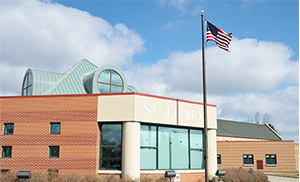Madara Dias of Bridgewater has successfully defended her Master’s thesis, “Development of a Dynamic Lateral Support for Wheelchair Users”. Dias is currently a student in Rutgers University’s Biomedical Engineering graduate program.
The Rutgers Biomedical Engineering program has collaborated with Matheny for the past four years. In a typical year, students enrolled in Rutgers University’s biomedical engineering major and working on their capstone senior project participate in a week-long immersion program at Matheny, a special hospital and school for children and adults with medically complex developmental disabilities. Rutgers students explore physical therapy, occupational therapy, speech therapy, wheelchair fabrication and customization, the wheelchair clinic, classes at both the Matheny School and the adult services program, and assistive technology. Access and exposure to Matheny services and programs enable the Rutgers students to better conceptualize and develop a plan for an innovative device designed to improve the lives of those with disabilities.
During their fall semester, student teams work on conceptualizing their idea and designing it. The spring semester is devoted to creating a prototype, testing it, refining it, and delivering a finished product. The Rutgers students are guided by Dr. Kristen S. Labazzo, an assistant professor of practice in biomedical engineering and the executive director of the Medical Device Development Center at Rutgers University. Labazzo also serves as Chair of the Matheny School Board.
Dias’ project built upon the work of a previous group of students who had conceptualized a different kind of lateral support for wheelchair users. A lateral support is used for patients who require additional support in order to maintain balance and stability while seated in their wheelchair. Their idea was to develop a lateral support that would not only hold the patient securely but allow them to move and bend from side to side, all while being affordable, adjustable, and dynamic.
According to Dr. Kristen Labazzo, “Madara was the ideal BME student who took advantage, not only of the variety of opportunities that crossed her path during her education (research, internships, co-ops), but she also diversified her skill set. BMEs can be trained in a variety of skills for multiple career paths, and Madara explored different areas of the field to get a better understanding of her interests.”
Dr. Labazzo added, “The collaboration with Matheny has been so rewarding, not just for me but for all of the students who have been involved. Interacting directly with the caregivers, clients and students at Matheny has been eye-opening, and puts our work in a different perspective. So far, the projects have been the focus of our senior design program, but Madara was inspired and wanted to further develop one for her Master’s thesis. We went through all the projects and determined that the dynamic lateral support had the best potential for advancement. It was also great that the student from the original group, Chris Evans, offered to be a resource, despite having graduated and working on his own Master’s degree.”
Adding to the challenge, the pandemic forced Dias to develop her project without being able to visit Matheny for in person consultations. However, Dias received support and encouragement from Matheny’s director of assistive technology, John Reck. According to Reck, “It was a pleasure working with Madara. She is an excellent learner and I am so happy to see where she has taken this project. This innovation and the many others that come out of the partnership with Rutgers will certainly help my colleagues and me better serve our patients.” Dias also worked closely with Rutgers University professors Dr. Kristen Labazzo, Dr. Noshir Langrana, and Dr. Natalie Macon.
Dias received her B.S. degree in Biomedical Engineering with a minor in Math from Rutgers University. She was awarded the NASA NJ Space Grant Consortium Fellowship which helped support her graduate education. Dias anticipates receiving a Master of Science in Biomedical Engineering, as well as a Certificate in Medical Device Design and Development, in May 2021. “This project was a great reminder of why I chose Biomedical Engineering – and that was to help people! I’m really grateful for the Rutgers-Matheny collaboration for giving me the chance to work on a project that could potentially make an impact on patient lives!” says Dias.



